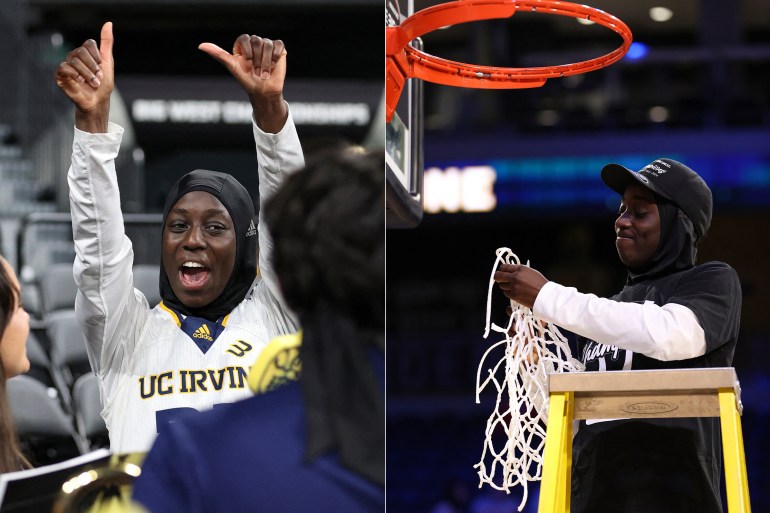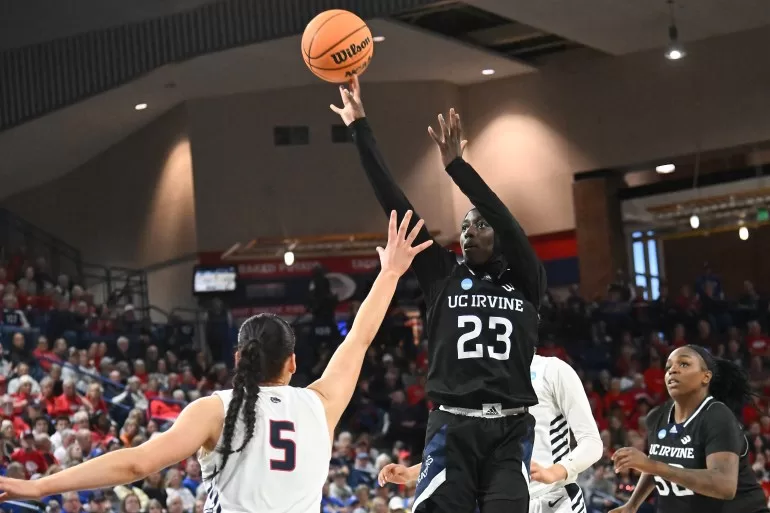Called up by the French Federation of Basketball (FFBB) at 17, she went on to play in the national youth teams in three major tournaments, reaching the finals of the U18 European Championship and the Youth Olympic Games in 2018, and winning a gold medal at the 2019 World Beach Games.
At the time, the sky was the limit.
She moved to the United States on a full scholarship to play with UC Irvine, surpassing 1,000 points in her collegiate career after scoring a season-high 20 against UC Santa Barbara in February 2023.
Now 24, Konate dreams of playing for France again, but it has become a trickier proposition.
What’s stopping Konate from another national call-up isn’t her potential – it’s that two years ago, she started wearing a hijab, a headscarf worn by many Muslim women to cover the hair and neck.
“I never thought it would be a big hindrance”, Konate told Al Jazeera, recalling how little changed when she started wearing it in the US at 22.
But when she wanted to play in a tournament in France that summer, match organisers told her she could only do it if she took off her hijab.
She felt “humiliated”, and later discovered that this was part of new FFBB regulations that forbid players from wearing “any equipment with a religious or political connotation”.
Konate felt “abandoned” by the FFBB and by many of her former national coaches, who never contacted her after Article 9.3 banning headscarves was implemented in December 2022.
Now, Konate has turned to activism to campaign with a collective called Basket Pour Toutes (Basketball For All) that includes mostly young hijab-wearing Muslim women in France who love basketball.
Together, they are defying a hijab ban in basketball and across French sports.
Their campaign is gaining momentum before the Paris 2024 Olympic and Paralympic Games, as French Sports Minister Amelie Oudea-Castera announced last September that French athletes wearing a hijab will be banned from competing.
Currently, any athlete wearing a hijab will be allowed to compete at Paris 2024 – except if they’re French.
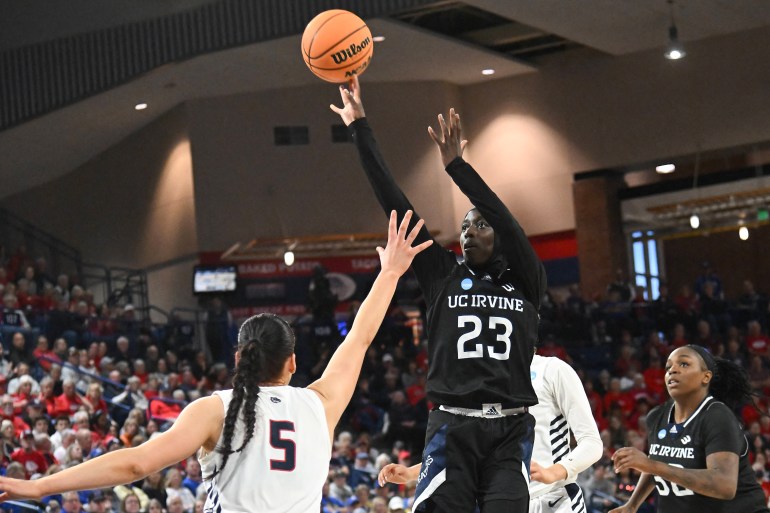
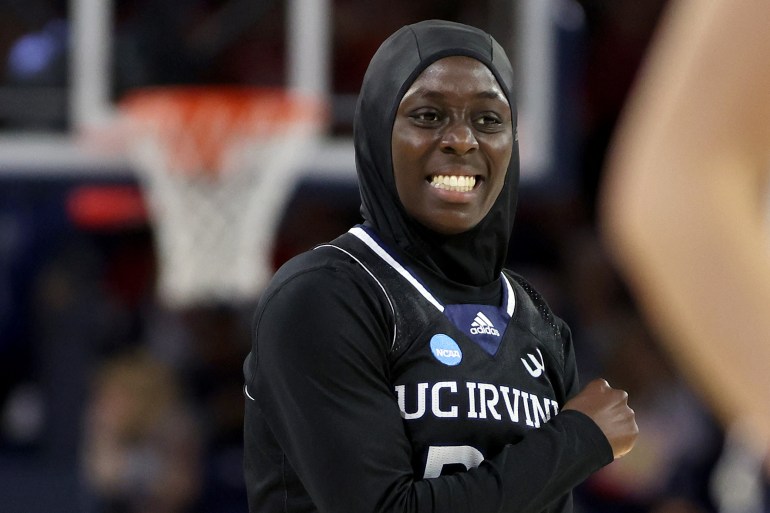
French laïcité and its impact on Muslim women
Timothee Gauthierot is a basketball club coach in the Paris suburb of Noisy-le-Sec – he is the co-founder of Basket Pour Toutes.
He said that even before this nationwide ban, there were very few hijab-wearing girls who dreamed of becoming professional athletes in France because “there is so much discrimination” against them. “We don’t allow them to reach that level”, he said.
Human rights experts have said the hijab ban in French basketball is part of a trend of policymakers “weaponising” France’s tradition of laïcité (secularism) to exclude Muslim women and girls from French society, drawing parallels with laws to ban the headscarf and later the abaya (loose-fitting, long-sleeved robe) in public schools, in 2004 and in 2023, respectively.
Campaigners have repeatedly pressured the FFBB to overturn Article 9.3, which was implemented without consultation from basketball clubs.
Several sources told Al Jazeera that the FFBB introduced new regulations after French senators voted to ban the hijab in sporting competitions in January 2022. This set a precedent as attempts by a collective of Muslim women footballers to allow the hijab in French football were struck down.
But Rim-Sarah Alouane, a legal expert on religious freedom, said these regulations “disproportionately impact Muslim women, thus amounting to indirect discrimination”. She added that “the principle of laïcité is meant to ensure state neutrality in religious matters, not to suppress religious expression”.
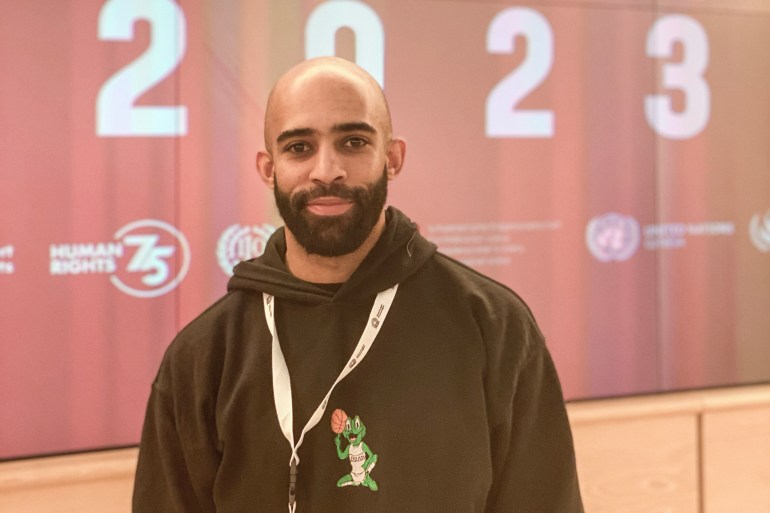
Paris 2024 Olympics – a case of ‘sportswashing’
Paris 2024 will be the first Olympic Games where human rights provisions are included in its Host City Contract.
The contract states that Paris 2024 intends to “guarantee respect for the human rights of all populations placed under its responsibility during the organisation”.
Ahead of the Olympics, Basket Pour Toutes is pushing for both the International Olympic Committee (IOC) and the International Basketball Federation (FIBA) to intervene against France’s hijab ban.
FIBA itself had a hijab ban until 2017, when it was overturned after an advocacy campaign. Meanwhile, the IOC allows athletes to wear headscarves in its competitions, but has not responded to letters by Amnesty International, FairSquare and the Sport and Rights Alliance calling for it to ensure France allows its hijab-wearing athletes to play sports.
For these reasons, Shireen Ahmed, an award-winning journalist focused on Muslim women in sports, said that these Olympics are the “biggest case of sportswashing”, as France claims to protect human rights while “being anti-Muslim in its own backyard”.
This issue is “all about choice” Ahmed said, describing how this ban relates to issues around women’s bodily autonomy and shows an attempt by policymakers to dictate what women can or cannot wear.
“Our objection is not with laïcité [secularism], it’s that it’s unevenly applied,” she said, noting how male athletes who wear a religious cross do not face the same scrutiny.
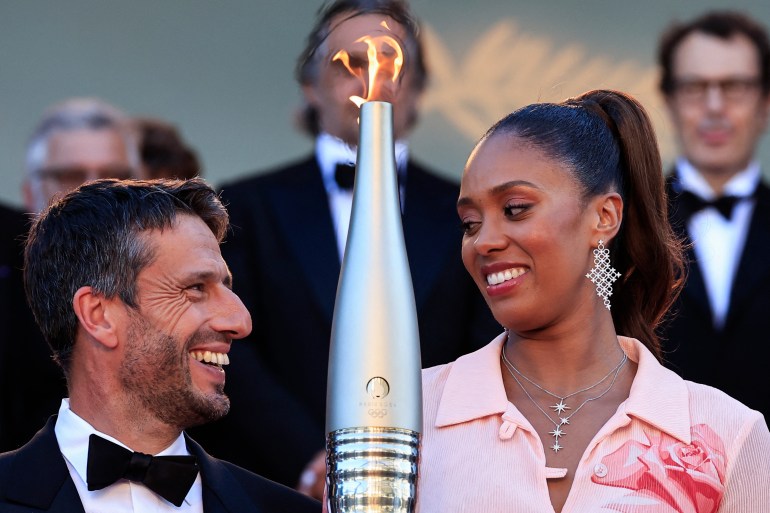
The trickle-down effects of French basketball’s hijab ban
Meanwhile, the French Federation of Basketball’s ban is having harsh effects on female Muslim athletes in France.
December 4, 2022 was the date that Helene Ba was first told she was banned from playing basketball.
Ba, a 22-year-old law student who grew up in the Paris suburb of Yvelines, recalls that “the most violent thing” on that match day was that the referee told her coach, instead of her, that she couldn’t play.
She said the referee didn’t even mention Article 9.3 – but instead remarked that wearing a hijab was “a problem of danger”.
But, knowing the law, she fought back.
“I said that I wouldn’t take off my hijab,” Ba told Al Jazeera. “FIBA [the world basketball body] authorises it, and this was a local match. It’s violent to ask a woman to take off a piece of cloth. This is a legal claim and we have the right to religion and the freedom to practice sports.”
But Ba said this didn’t stop people in the stands from asking “Are you sure you don’t want to take it off?” She refused to because “faith always comes first”, she said. Ba then left the stadium and her team played without her.
It was then that Ba realised she had to do something about this, not just for her but for all Muslim athletes in France. “When you attack the freedoms of minorities, you attack everyone,” Ba said. “This [Article 9.3] damages the image of basketball.”
Through mutual acquaintances, Ba would meet two pivotal people with whom she would co-found Basket Pour Toutes: coach Timothee Gauthierot and sociologist Haifa Tlili.
After conducting more than 150 interviews with Muslim girls in sports in France, Tlili said that “we do not realise the effects of these traumas” triggered by the hijab ban.
“Many girls have told me: ‘If you take basketball away from me, what do I have left?’,” she said.
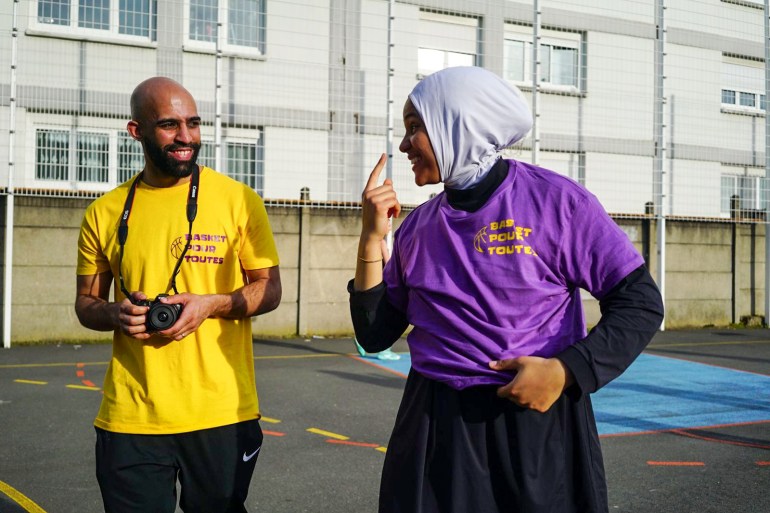
Solidarity and criminalisation on the basketball court
Badiaga Coumba, a 21-year-old who plays in Gauthierot’s club in Noisy-le-Sec, said that since the FFBB’s ruling took effect, she has felt lost, unsure what to do with herself, and has pretty much given up basketball, although she considers her teammates her “second family”.
But unlike Ba, who was one of the only Muslim athletes at her club and who was left out when the hijab ban was implemented, Coumba is in a very diverse club: almost fully gender equal (rare for most basketball clubs), and with many Black and Muslim players.
On a team of 10 girls, there are usually three who wear the hijab, creating a strong sense of solidarity.
When referees started telling coaches that hijab-wearing athletes could not even sit on the bench, most French clubs followed the rules – but not Coumba’s club.
The eligible players went on the pitch, placed the ball on the ground, and refused to play. Referees would quickly grasp what was happening, and call off the match.
Gauthierot, who has stood by his female athletes when they’ve done this, has faced severe legal reprisals by the FFBB, and even the president of the Paris region, Valerie Pecresse. On October 7, 2023, she posted on X, formerly Twitter, “I call on the State to stop leaving competition referees alone in the face of Islamist attempts to destabilise sport grounds”.
After receiving a collective letter from 70 Paris clubs protesting this basketball hijab ban, Pecresse ordered the suspension of “any subsidy to a club violating our charter of laïcité”.
Since most clubs are dependent on public funds, as many as 20 clubs have been heavily impacted and have had to retract their support.
The FFBB has also hit back directly against Gauthierot, fining him 300 euros ($325) and suspending him from all official capacities in basketball for six months from September 2024, in an ongoing case that Gauthierot is legally contesting.
“They say that it [the hijab] can lead to radicalisation, but we really live in harmony,” Gauthierot said. “They [the FFBB] make decisions without knowing us.”
Gauthierot, who is of Guadeloupean origin, cited sports legends who stood up against discrimination as role models, like modern American football’s Colin Kaepernick; or former US runners Tommie Smith and John Carlos, who gave the Black Power salute at the 1968 Mexico City Olympics.
“I’ve got nothing to lose,” said Gauthierot, who works in IT and volunteers at the local basketball club. “I’d rather do it without discriminating against girls.”
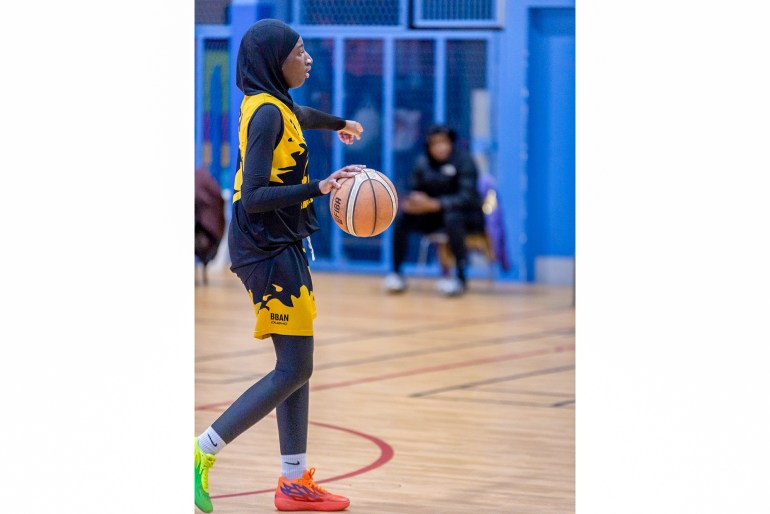
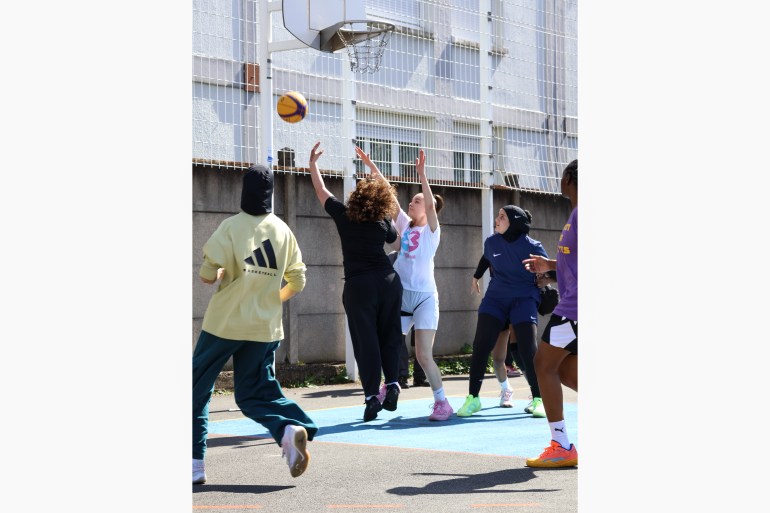
Representation matters, especially at the Olympics
Critics of the hijab ban point out that this is happening while France prepares to host the first Olympic Games to reach full gender parity, making the situation even more alarming.
“By proudly claiming that the Games will be ‘gender equal’, the French authorities are exposing their own hypocrisy of celebrating such alleged advancements while at the same time discriminating against Muslim women and girls through hijab bans in sports,” Amnesty International researcher Anna Blus said.
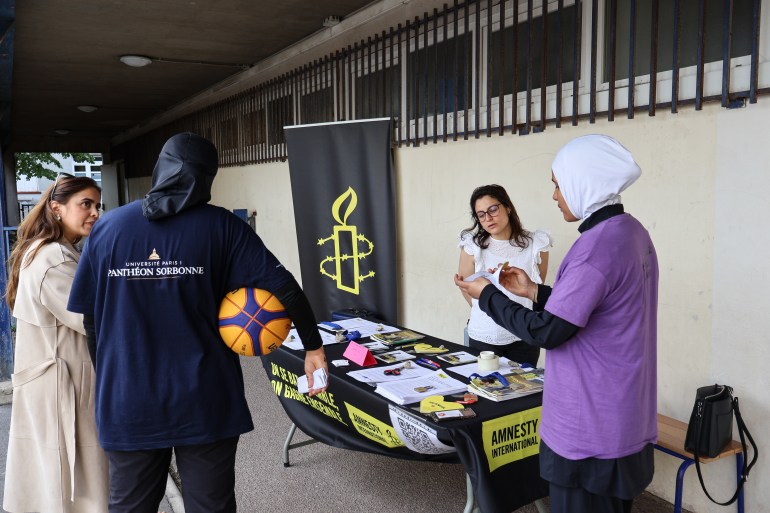
Andrea Florence, director of the Sports & Rights Alliance, highlighted, “It’s the Olympic principle 6 [of the Olympic Charter] that people should enjoy sports without discrimination of any kind. It’s not about the number of people banned, it’s about those who can’t even be included.”
Al Jazeera contacted the FFBB, the French Ministry of Sports, FIBA, and the IOC for comment. Only FIBA replied, stating that “the headgear is allowed in Official Basketball Competitions, including the Olympic Games, in accordance with the Official Basketball Rules”. It did not specify if it would intervene against the FFBB’s hijab ban.
Despite challenging times for the girls from Basket Pour Toutes, they are not losing hope in their fight for justice.
Last April, they organised a massive tournament in Noisy-le-Sec open to all women. Twenty-five teams and 90 girls took part, in what Helene Ba described as an opportunity “to show the FFBB that everything is fine and that we can play without any problems”.
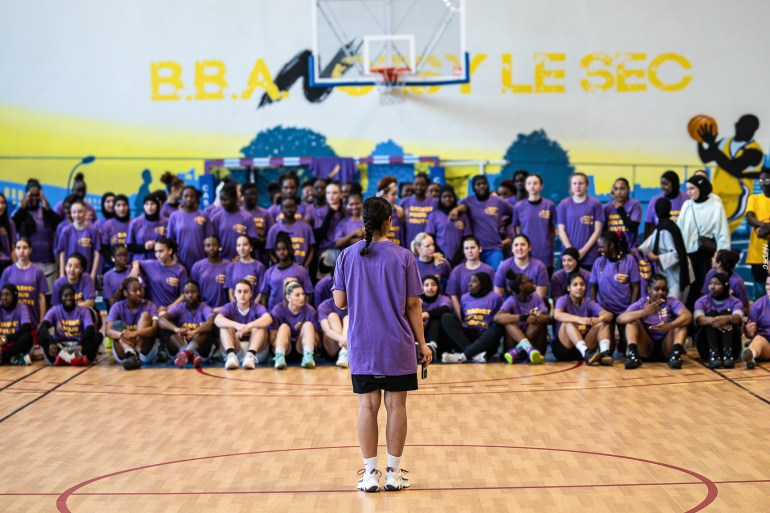
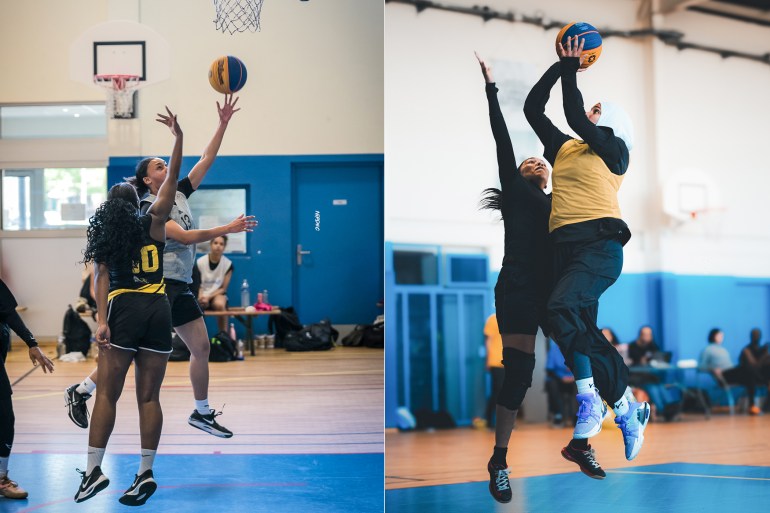
Meanwhile, Diaba Konate – who recognises that she is one of the few Muslim girls in France who had the privilege to move to the US to pursue the sport she loves – is now coming back to her country to pave the way for cultural change in French basketball, and to be closer to family.
She said that no woman should have to move away from home to play sports, and vowed to use her experiences to support others.
“There’s a battle to be fought in France. I want to help the FFBB to deconstruct stereotypes about veiled women as there’s a lot of prejudice,” Konate said. “We don’t want to make that choice [between faith and sport]. We shouldn’t be forced to do these things.”
“Representation matters. It’s important to have role models. You need people [who look] like you to be inspired. I have accomplished everything I wanted – now it’s for the future generations.”
